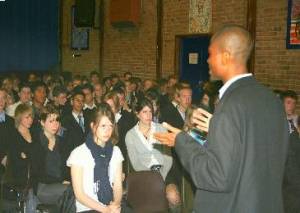|
The Imam and the
Pastor’ shown in Berkshire Sixth Forms
5 October 2007

Musa
Aliyu and Howard Grace spent a week leading sessions in
Berkshire Sixth Forms based on the film The Imam and
the Pastor. They report on their experience. At the end of their final session, a girl
said with conviction “You are actually doing something
about the situation”, and that she wanted to do
something in her setting. Musa will be visiting schools
in Oxford, Nottingham and London in the coming weeks.
Musa Aliyu spent
the week of 23-28 Sept with Howard Grace facilitating
sessions in nine Berkshire Sixth Forms, mostly in
Reading and Newbury. A 12-minute excerpt (starting at
chapter 2) of the film The Imam and the Pastor
was shown. This set the scene for questions to Musa,
with lively and searching discussion.
Musa is a Nigerian who is doing a PhD in London on, 'The
role of the media in the inter-religious conflict in
Northern Nigeria'. During this conflict, in which over
50,000 people were killed, he was working as a
journalist with one of the biggest Nigerian national
newspapers. At one point, when he was covering a story,
a Muslim mob attacked a Christian girl and it looked
like she would be killed. So he, a Muslim, abandoned his
camera and notepad and intervened. The girl was saved
but in the process Musa’s arm was fractured and he was
nearly beheaded. For the following year he felt
traumatized.
It was such experiences which led to a deep conviction
in him to play a part in reconciling and building
community, also to do a PhD exploring the role of the
media in this. The students we met (often in groups of
100 – 150) were struck and challenged by what Musa
shared. This helped to give context to what they saw in
the film of the deep change, reconciliation and working
together of Imam Ashafa and Pastor Wuye.
We were able to try different approaches in the various
schools. The one that enabled us to have the best
interchange was when we started the session by quoting a
student who said, 'Deep down we all long to make a
difference.' The students were asked whether they agreed
with that. We then quoted a boy who said, 'I just want
to have an easy life and make lots of money.' It became
clear that we all have both sentiments acting inside us
to different degrees. This discussion got the students
used to contributing their ideas and also led to a
deeper search on the main theme.
Earlier in the week, we asked for any questions or
comments after the film. This worked quite well as we
also had follow-up questions ready to ask them, such as,
'What were the key steps that led to Ashafa’s change of
heart?' Most answers focussed on the challenge he felt
from the Qur’an and the example of forgiveness the
Prophet Mohammed showed when people attacked and stoned
him. It was an eye-opener to most of the students in our
sessions that this was the true message of Muslim
teaching. Students were also struck by the fact that the
Muslim changed his attitude before the Christian, but
also that both the men had to radically move out of
their comfort-zones to begin their reconciling work
together.
As the week went on, we found that a better approach to
initiating discussion was to simply ask, 'What struck
you most about what you have just seen?' That led more
naturally to the issues we wanted to get to. We also
asked whether you need to be religious in order to
forgive such deep wounds. Generally the students felt
that anyone could go through that experience, but that
being religious would probably help to focus the
process. However, all felt challenged by the fact that
their experiences pale into insignificance compared to
what the people in the film went through and had come to
terms with.
We were left with the sense that, in those schools we
visited, if any issues come up in the future which
involve Muslim/Western conflict, the students will have
a much more constructive reaction to it. The film makes
a great impact and our discussions were very worthwhile.
But what seemed to also make a real impression is the
fact that we, Muslim and Christian, were going beyond
understanding and tolerance, to deliberately work
together to address this important issue in society. At
the end of our final session a girl stood up and said
with conviction that she was struck by our launching out
together. 'You are actually doing something about the
situation.' She then said that she wanted to do
something in her setting.
Many of the students had their perceptions broadened
towards the lives and challenges of Jesus and Mohammed.
This is not just about believing in certain doctrines,
but it concerns deep personal change and reaching out to
others with love in our hearts.
Howard Grace & Musa Aliyu, October 2007
|

